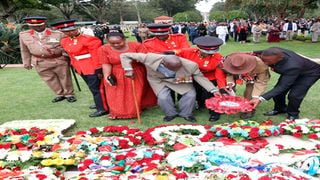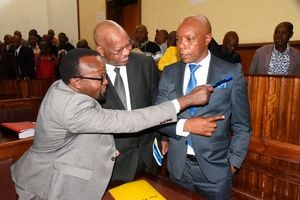
Abdikadir Nur Madhar and Fredrick Mwongela are assisted to lay a wreath at the Commonwealth War Cemetery on Ngong Road in Nairobi to mark Remembrance Sunday on November 12.
| Evans Habil | Nation Media GroupNews
Premium
World War II heroes recall experiences at ceremony
For 97-year-old Kenneth Kiarie Njoroge, the sound of The Last Post, a tune played as part of military traditions for a fallen soldier, is not only a reminder of the colleagues he lost during World War II, but of how he was plunged into a conflict he barely understood.
In a brief interview with the Nation at the Commonwealth War Graves Cemetery on Sunday, November 12, Kiarie recalled how when the war erupted, he was picked from school and thrust into a brief military training that changed the course of his life for good.
“I was born on April 12, 1926 and taken through school like any other ordinary child. But while at Kambui Secondary School in Githunguri, Kiambu County, the Second World War broke out and I was thrust into it,” he recalled.
From the school, he was taken for training at the signals unit before he was immersed into the world of secret military communications. He recalled being based at the army headquarters in Nairobi.
“During the war, there were secret messages that would be sent and received through codes, that was my job. We would get intelligence from several corners which would entail, for example, the particulars of a certain vehicle or plane and communicate back,” he said, adding that his role covered the whole of East Africa.
After the war, Kiarie joined the post office as a postmaster in Oljororok before later retreating to his village to prepare for his retirement.
Ninety-nine-year-old Moses Mbugua Muiru’s story is only slightly different from Kiarie’s—he joined the war as a serving soldier in the army attached to the transport department. He, too, left school at Class Six to join the military where he trained as a mechanic.
“I was repairing motor vehicles in the Mbagathi area and later Gilgil when the call to move to Burma came. I stayed there for a year repairing ships and vehicles and later returned to Kenya briefly before I was deployed to Somaliland. In 1948, when the war ended, I came back home,” he recalled. In hindsight, Mbugua says even though he feared gunshots, he learnt a lot of things that set him up for success in life.
“I also became a truthful man courtesy of my interactions with wazungus (white people) and I believe that is part of why God has blessed me with a long, healthy life. I was born in 1924, in about two months I shall be turning 100 years old,” he said.
The two spoke to the Nation on the sidelines of Remembrance Sunday, a day meant to commemorate fallen military and servicemen and women who were involved in World War I and II, at the Commonwealth War Graves Cemetery on Ngong Road.
The brief ceremony, that included a symbolic procession to the cemetery, prayers and laying of wreaths, was attended by serving Kenya Defence Forces soldiers, World War II veterans, their families and diplomats from other commonwealth countries.
“We are grateful for the roles you played, challenges you withstood and paths you set for us and that is why we are here today,” General Officer Commanding Eastern Command Major-General Juma Mwinyikai told the veterans.
Also present was Abdikadir Nure Madar who in 2015 attended the commemoration in the United Kingdom where he was given a medal by the queen. This year, he was among Kenyans recognised as heroes on Mashujaa Day by President William Ruto for his efforts in fostering peace and harmony in the community.
In her remarks, British Deputy High Commissioner Josephine Gauld recalled that the ripple effects of the war that broke out in Europe were felt many thousands of kilometres way, including East Africa where over two million Africans were affected.
“We are here to remember and pay our respects to the men and women who ultimately gave their lives to protect others,” she said.





